英语常用句型
(完整版)英语常用句型大全
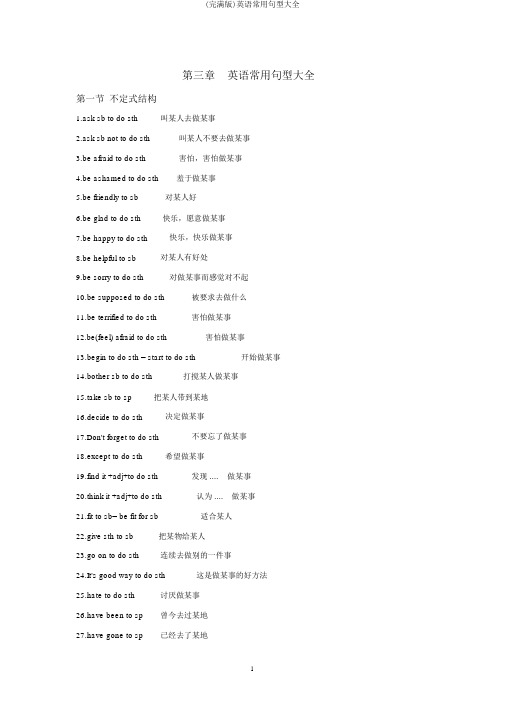
第三章英语常用句型大全第一节不定式结构1.ask sb to do sth叫某人去做某事2.ask sb not to do sth叫某人不要去做某事3.be afraid to do sth害怕,害怕做某事4.be ashamed to do sth羞于做某事5.be friendly to sb对某人好6.be glad to do sth快乐,愿意做某事7.be happy to do sth快乐,快乐做某事8.be helpful to sb对某人有好处9.be sorry to do sth对做某事而感觉对不起10.be supposed to do sth被要求去做什么11.be terrified to do sth害怕做某事12.be(feel) afraid to do sth害怕做某事13.begin to do sth = start to do sth开始做某事14.bother sb to do sth打搅某人做某事15.take sb to sp把某人带到某地16.decide to do sth决定做某事17.Don't forget to do sth不要忘了做某事18.except to do sth希望做某事19.find it +adj+to do sth发现 ....做某事20.think it +adj+to do sth认为 ....做某事21.fit to sb= be fit for sb适合某人22.give sth to sb把某物给某人23.go on to do sth连续去做别的一件事24.It's good way to do sth这是做某事的好方法25.hate to do sth讨厌做某事26.have been to sp曾今去过某地27.have gone to sp已经去了某地28.have sth to do有什么事情要做29.hope to do sth希望做某事30.introduce sb to sb介绍某人给某人认识31.invite sb to do sth邀请某人做某事32.It takes sb +一段时间 +to do sth花多久时间做某事33.It's +adj+ to do sth做某事怎么样34.It's a good idea for sb to do sth对某人来说去做某事是个好想法35.learn to do sth学着去做某事36.make a decision to do sth下定信心做某事37.want to do sth想要做某事38.need to do sth需要去干某事39.offer sth to sb给某人供应某物40.pretend to do sth装着去做某事41.take sth to sb带某物给某人42.like to do sth喜欢做某事43.show sth to do把某物拿给某人看44.encourage sb to do sth激励某人去做某事45.warn sb to do sth劝说某人做某事46.be used to do sth被用来做某事47.It's best to do sth最好去看某事48.stop to do sth停下来往做某事49.Have nothing to do with与做某事不有关50.be allowed to do被同意做某事51.forget to do sth忘记做过某事52.would like to do sth想要做某事53.prefer sth to sth喜欢某物胜过某物54.Prefer to do sth rather than do喜欢做某事胜过做某事55.Say hello to sb向某人问好56.It's time to do sth是做某事的时间到了57.trouble sb to do sth麻烦某人某事58.tell sb to do sth叫某人做某事59.need to do sth需要干某事60.It's a good place to do sth它是做某事的好地方第二节动原结构1.Would you please do sth请你做某事2.can do sth能够做某事 may ,must,could,might,would,should,shall3.be going to do sth打算,将去做某事4.need do sth必定干某事5.had better do sth最好干某事6.have to do sth不得不去做某事7.let sb do sth让某人做某事8.make sb do sth使得某人做某事9.have sb do sth让某人做某事10.Why not do sth为什么不去做某事11.Why don't you do sth你为什么不去做某事12. 句子里面有 do,does,don't,does't did,didn't ,后边动词 +do sth13.prefer to do sth rather than do sth喜欢做某事而不去做某事14.would rather do sth than do sth宁愿而不ed to do sth过去常常做某事16.do nothing but do sth除了做 sth不能够做任何其他事情17.help sb do sth帮助某人做某事18.Feel,listen,look,see,hear,notice,wacth+do sth19.please do sth请做某事20. 神情动词〔 can,may,must,will,ought. to ,might,could,dare to )+动原〔 do sth)第三节动词 ing句型1.feel like doing sth想要做某事2.stop.... .from doing sth阻拦。
35个经典英语句型

ããåãAdj + as + Subject(主è¯)+ be, S + V~~~ (è½ç ¶......)
ãã ä¾ å ¥ï¼Rich as our country is, the qualities of our living are by no means satisfactory. {by no means = in no way = on no accountä¸ ç ¹ä¹ ä¸}
ããåå «ãbe + forced/compelled/obliged + to + V (ä¸ å¾ ä¸......)
ãã ä¾ å ¥ï¼Since the examination is around the corner, I am compelled to give up doing sports.
ãã å¼ è å¸ æ¯ææ ¾ç» é å °æ ä» æ ç æ å¸ ã
ããäºãNothing is + ~~~ er than to + V
ããNothing is + more +形容è¯+ than to + V
ãã ä¾ å ¥ï¼Nothing is more important than to receive education.
ãã ä¾ å ¥ï¼It pays to help others.
ãã å¸®å ©å «äººæ ¯å ¼å¾ ç ã
ããäºå å ãbe based on (以......ä¸ºå ºç¡)
英语最常用的60个句型及例句
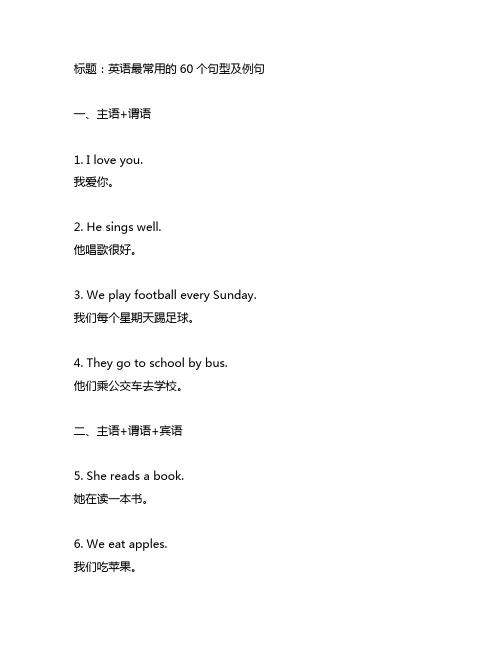
标题:英语最常用的60个句型及例句一、主语+谓语1. I love you.我爱你。
2. He sings well.他唱歌很好。
3. We play football every Sunday. 我们每个星期天踢足球。
4. They go to school by bus.他们乘公交车去学校。
二、主语+谓语+宾语5. She reads a book.她在读一本书。
6. We eat apples.我们吃苹果。
7. He speaks English.他讲英语。
8. They watch TV.他们看电视。
三、主语+谓语+宾语+宾语补足语9. She paints the wall red.她把墙刷成了红色。
10. We call him a hero.我们称他为英雄。
11. He considers the plan unfeasible. 他认为这个计划不可行。
12. They make their father proud.他们让父亲感到自豪。
四、主语+系动词+表语13. I am a teacher.我是一名老师。
14. She was happy.她很快乐。
15. He is my friend.他是我的朋友。
16. They are students.他们是学生。
五、主语+谓语+间宾+直宾17. She teaches us English. 她教我们英语。
18. He bought her a gift. 他给她买了一份礼物。
19. We tell him a story.我们给他讲故事。
20. They show us the way.他们给我们指路。
六、主语+谓语+宾补+宾语21. She made her sister cry.她让她妹妹哭了。
22. They found the problem solved. 他们发现问题已经解决了。
23. He heard the news spread.他听说了消息已经传开了。
英语常用句型100句

英语常用句型100句1. It's a pleasure to meet you. (很高兴见到你。
)2. How are you? (你好吗?)3. What's your name? (你叫什么名字?)4. Where are you from? (你来自哪里?)5. How old are you? (你多大了?)6. Can you speak English? (你会说英语吗?)7. What do you do for a living? (你的职业是什么?)8. How do you spell that? (你怎么拼写那个?)9. What is your favorite food? (你最喜欢的食物是什么?)10. Where do you live? (你住在哪里?)11. What time is it? (现在几点了?)12. Can you help me? (你能帮助我吗?)13. I don't understand. (我不明白。
)14. Could you please repeat that? (你能再重复一遍吗?)15. How much does it cost? (这个多少钱?)16. Where is the nearest bank? (最近的银行在哪里?)17. What's the weather like today? (今天天气怎么样?)18. I'm sorry. (对不起。
)19. Excuse me. (打扰一下。
)20. Do you have any questions? (你有什么问题吗?)21. Nice to meet you. (很高兴认识你。
)22. How do you do? (你好。
)23. What do you think? (你觉得怎么样?)24. Can I help you? (我能帮你吗?)25. What's your favorite color? (你最喜欢的颜色是什么?)26. Where are you going? (你要去哪里?)27. What do you want to do? (你想做什么?)28. How was your day? (你今天过得怎么样?)29. Can you show me on the map? (你能在地图上给我看吗?)30. What's your phone number? (你的电话号码是多少?)31. How long have you been learning English? (你学英语学了多久了?)32. How far is it from here? (离这里有多远?)33. What's your favorite movie? (你最喜欢的电影是什么?)34. Do you have any siblings? (你有兄弟姐妹吗?)35. What's your favorite book? (你最喜欢的书是什么?)36. What's your favorite sport? (你最喜欢的运动是什么?)37. Can I have a glass of water, please? (请给我一杯水。
英语常用句型
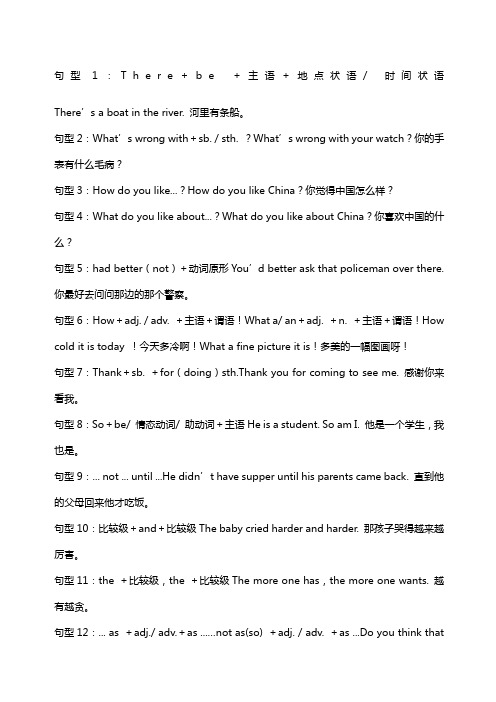
句型1:T h e r e+b e+主语+地点状语/时间状语There’s a boat in the river. 河里有条船。
句型2:What’s wrong with+sb. / sth. ?What’s wrong with your watch?你的手表有什么毛病?句型3:How do you like...?How do you like China?你觉得中国怎么样?句型4:What do you like about...?What do you like about China?你喜欢中国的什么?句型5:had better(not)+动词原形You’d better ask that policeman over there. 你最好去问问那边的那个警察。
句型6:How+adj. / adv. +主语+谓语!What a/ an+adj. +n. +主语+谓语!How cold it is today !今天多冷啊!What a fine picture it is!多美的一幅图画呀!句型7:Thank+sb. +for(doing)sth.Thank you for coming to see me. 感谢你来看我。
句型8:So+be/ 情态动词/ 助动词+主语He is a student. So am I. 他是一个学生,我也是。
句型9:... not ... until ...He didn’t have supper until his parents came back. 直到他的父母回来他才吃饭。
句型10:比较级+and+比较级The baby cried harder and harder. 那孩子哭得越来越厉害。
句型11:the +比较级,the +比较级The more one has,the more one wants. 越有越贪。
句型12:... as +adj./ adv.+as ...…not as(so) +adj. / adv. +as ...Do you think thatart is as important as music?你认为艺术和音乐一样重要吗?Last Sunday the weather was not so wet as it is today. 上个星期天的天气不如今天的天气潮湿。
六大基本句型英语例句

六大基本句型英语例句1、(主语)+(谓语)。
2、(主语)+(系动词)+(表语)。
3、(主语)+(谓语)+(宾语)。
4、(主语)+(谓语)+(间接宾语)+(直接宾语)。
5、(主语)+(动词)+(宾语)+(补语)。
6、There be + 主语 + 其它。
扩展资料一、句型1: Subject (主语) + Verb (谓语)这种句型中的动词大多是不及物动词,常见的动词如:work, sing, swim, fish, jump, arrive, come, die, disappear, cry, happen 等。
如:1、Li Ming works very hard.李明学习很努力。
2、The little girl cried even harder. 小女孩哭得更厉害了。
3、The accident happened yesterday afternoon.事故是昨天下午发生的。
二、句型2:Subject (主语) + Link. V(系动词) + Predicate(表语)这种句型主要用来表示主语的特点、身份等。
其系动词一般可分为下列两类:(1)表示状态。
这样的'词有:be, look, seem, smell, taste, sound, keep等。
如:1、This kind of food tastes delicious.这种食物吃起来很可口。
2、He looked worried just now.刚才他看上去有些焦急。
(2)表示变化。
这类系动词有:become, turn, get, grow, go等。
如:1、Spring comes. It is getting warmer and warmer.春天到了,天气变得越来越暖和。
2、The tree has grown much taller than before.这棵树比以前长得高多了。
三、句型3:Subject(主语) + Verb (谓语) + Object (宾语)这种句型中的动词一般为及物动词。
简单英语句型30个

简单英语句型30个导语:句型是句子的结构类型。
下面是YJBYS店铺收集整理的30个简单实用的`英语句型,希望对你有帮助!句型31:keep sb. / sth. +adj./ V-ing/ 介词补语/ adv.You must keep your classroom clean.你们必须保持教室干净。
Sorry to have kept you waiting.对不起,让你久等。
Can you keep him in the room ?你能让他在这个房里吗?Keep them here.让他们在这儿呆着。
句型32:find +宾语+宾补He finds it very hard to travel around the big city .他发现要环游这个大城市是很难的。
句型33:... not ... anymore/ longerThe old man doesn't travel any more.这位老人不再旅行了。
He isn't a thief any longer.他不再是个贼。
句型34:What's the weather like...?What's the weather like in spring in your hometown?在你们家乡春天天气怎么样?句型35A:There is no time to doThere was no time to think.没有时间思考。
句型35B:have no time to doI have no time to go home for lunch.我没有时间回家吃午饭。
句型36:Help oneself to...Help yourself to some fish.吃鱼吧!句型37:used to doI used to read this kind of story books.我过去常读这种故事书。
英语的句型句式大全

英语的句型句式大全一、基础句型1.Subject + Verb–Examples:•She runs.•They eat.2.Subject + Verb + Object–Examples:•I love you.•He reads books.3.Subject + Verb + Indirect Object + Direct Object–Examples:•She gave me a gift.•He bought her a car.4.Subject + Verb + Complement–Examples:•She is happy.•They are friends.二、特殊句型1.Question Form–Examples:•Where is the cat?•Did you see the movie?2.Conditional Sentences–Examples:•If it rains, we will stay inside.•She would come if she had time.3.Passive Voice–Examples:•The book was written by the author.•The cake was eaten by the children.三、复杂句式1.Relative Clauses–Examples:•The boy who is wearing a red shirt is my brother.•The book that I borrowed from the library is interesting.2.Coordinating Conjunctions–Examples:•I want both the cake and the ice cream.•He is not only smart but also kind.3.Subordinating Conjunctions–Examples:•Although it was raining, we went out.•She will come when she finishes work.四、强调句型1.It is/was + Adjective + that/who + Subject + Verb–Example:•It was Mary who won the competition.2.Subject + Verb + what/who/which + Object + Verb–Example:•I saw what you did.五、形容词和副词的句型1.Adjective + Noun–Examples:•Beautiful flowers•Fast car2.Adverb + Verb–Examples:•Quickly run•Carefully readparative and Superlative Forms–Examples:•He is taller than his brother.•She is the smartest in the class.六、感叹句型1.What + Noun + Subject + Verb!–Example:•What a beautiful day it is!2.How + Adjective/Adverb + Subject + Verb!–Example:•How quickly he runs!以上是英语中常见的句型句式,掌握这些基础句型和特殊句型可以帮助提升英语表达能力,丰富句子结构,让语言更加生动自然。
英语 万能 句型

英语万能句型以下是一些英语中常用的万能句型,希望对你有所帮助:1. It is + (形容词) + for sb. + to do sth.(对某人来说做某事是……的)- It is important for us to learn English. 对我们来说学习英语是重要的。
2. It is + (形容词) + that + 句子(……是……的)- It is clear that he is telling the truth. 很明显他在说真话。
3. There is no doubt that + 句子(毫无疑问……)- There is no doubt that he will succeed. 毫无疑问他会成功。
4. As far as I am concerned, ... (就我而言,……)- As far as I am concerned, this plan is not practical. 就我而言,这个计划不切实际。
5. In my opinion, ... (在我看来,……)- In my opinion, this is the best solution. 在我看来,这是最好的解决方案。
6. It goes without saying that + 句子(不言而喻,……)- It goes without saying that health is the most important thing. 不言而喻,健康是最重要的。
7. It can be said with certainty that + 句子(可以肯定地说,……)- It can be said with certainty that this decision is correct. 可以肯定地说,这个决定是正确的。
8. It is worth noting that + 句子(值得注意的是,……)- It is worth noting that this is a common problem. 值得注意的是,这是一个普遍存在的问题。
英语六种基本句型
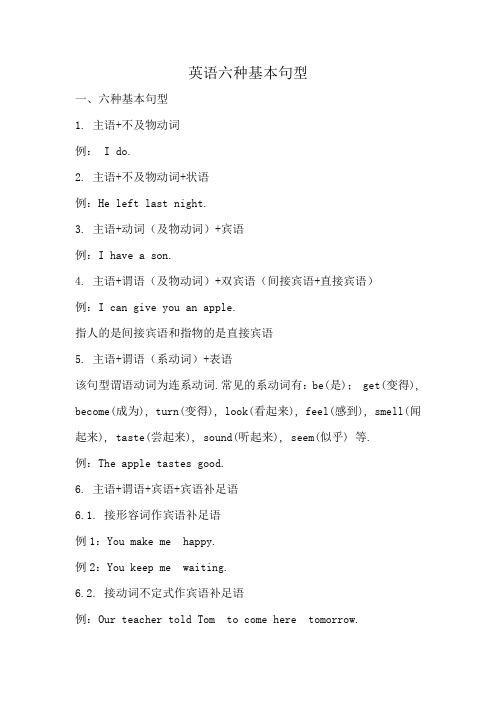
英语六种基本句型一、六种基本句型1. 主语+不及物动词例: I do.2. 主语+不及物动词+状语例:He left last night.3. 主语+动词(及物动词)+宾语例:I have a son.4. 主语+谓语(及物动词)+双宾语(间接宾语+直接宾语)例:I can give you an apple.指人的是间接宾语和指物的是直接宾语5. 主语+谓语(系动词)+表语该句型谓语动词为连系动词.常见的系动词有:be(是); get(变得), become(成为), turn(变得), look(看起来), feel(感到), smell(闻起来), taste(尝起来), sound(听起来), seem(似乎) 等.例:The apple tastes good.6. 主语+谓语+宾语+宾语补足语6.1. 接形容词作宾语补足语例1:You make me happy.例2:You keep me waiting.6.2. 接动词不定式作宾语补足语例:Our teacher told Tom to come here tomorrow.6.3. 宾语补足语为动词原形或doing形式四看:watch、see、look、notice、observe二听:listen to (听)、hear(听见)一感觉:feel(感觉)宾语补足语用动词原形 (省略to)表示全过程,用doing形式表示该动作当时正在发生。
例1: We see her dance in the next door.我们看到她在隔壁跳舞。
(全过程)例2: We see her dancing in the next door. 我们看到她正在在隔壁跳舞.。
常见的45个英语句型
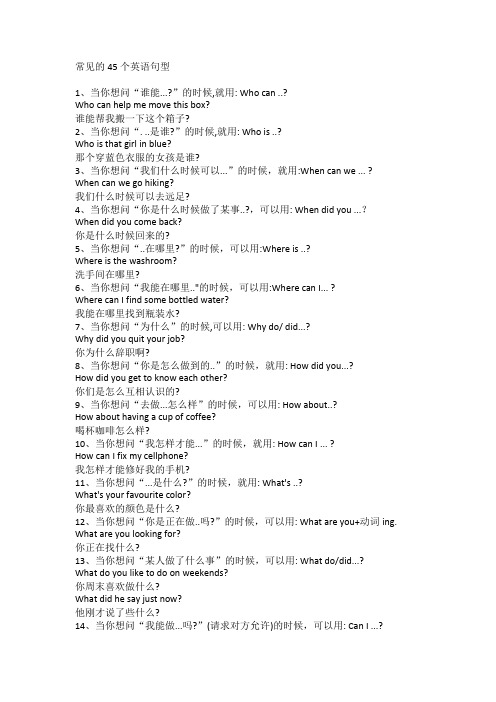
常见的45个英语句型1、当你想问“谁能...?”的时候,就用: Who can ..?Who can help me move this box?谁能帮我搬一下这个箱子?2、当你想问“. ..是谁?”的时候,就用: Who is ..?Who is that girl in blue?那个穿蓝色衣服的女孩是谁?3、当你想问“我们什么时候可以...”的时候,就用:When can we ... ? When can we go hiking?我们什么时候可以去远足?4、当你想问“你是什么时候做了某事..?,可以用: When did you ...?When did you come back?你是什么时候回来的?5、当你想问“..在哪里?”的时候,可以用:Where is ..?Where is the washroom?洗手间在哪里?6、当你想问“我能在哪里.."的时候,可以用:Where can I... ?Where can I find some bottled water?我能在哪里找到瓶装水?7、当你想问“为什么”的时候,可以用: Why do/ did...?Why did you quit your job?你为什么辞职啊?8、当你想问“你是怎么做到的..”的时候,就用: How did you...?How did you get to know each other?你们是怎么互相认识的?9、当你想问“去做...怎么样”的时候,可以用: How about..?How about having a cup of coffee?喝杯咖啡怎么样?10、当你想问“我怎样才能...”的时候,就用: How can I ... ?How can I fix my cellphone?我怎样才能修好我的手机?11、当你想问“...是什么?”的时候,就用: What's ..?What's your favourite color?你最喜欢的颜色是什么?12、当你想问“你是正在做..吗?”的时候,可以用: What are you+动词ing. What are you looking for?你正在找什么?13、当你想问“某人做了什么事”的时候,可以用: What do/did...?What do you like to do on weekends?你周末喜欢做什么?What did he say just now?他刚才说了些什么?14、当你想问“我能做...吗?”(请求对方允许)的时候,可以用: Can I ...?Can I take a look at your notebook?我能看一下你的笔记本吗?15、当你想问“你能做... 吗?”,提出请求的时候,可以用: Could you/Would you...? Could you tell me what time the store is open?你能告诉我这家店几点营业吗?16、当你想问“你是...吗?”的时候,就用: Are you...?Are you Mr. Brown?你是布朗先生吗?Are you making dinner now?你现在是在做晚饭吗?17、除此之外,问对方很多其他情况,都可以用: Doyou+动词...Do you need any help?你需要帮助吗?Do you mind if I open the window?你介意我打开窗户吗?18、当你想要问“你是否(已经)做了某件事”的时候,可以用: Have you ..? Have you seen the message I sent you?你(已经)看到我发给你的信息了吗?19、当你想问某事物的情况的时候, 可以用: Is it ..?Is it close to your house?那离你家近吗?20、当你想陈述自己的情况和观点的时候,可以用: I'm (not)+形容词/名词I'm good at dancing.我擅长跳舞。
英语的重要句型

英语的重要句型
1、主语+谓语:这种句型是最基本的英语句型,它只包括主语和谓语,没有宾语和补语。
例如,“She sings beautifully”(她唱得很美)。
2、主语+谓语+宾语:这种句型包括主语、谓语和宾语,是最常见的英语句型之一。
例如,“She loves music”(她热爱音乐)。
3、主语+谓语+间接宾语+直接宾语:这种句型包括主语、谓语、间接宾语和直接宾语,通常用来表达谁做了什么事情。
例如,“She gave me a book”(她给了我一本书)。
4、主语+谓语+宾语+宾补:这种句型包括主语、谓语、宾语和宾语补足语,用来表达谁做了什么事情以及这个事情对其他事物的影响。
例如,“They made their hut with stones”(他们用石头建造了他们的棚屋)。
5、主语+谓语+状语:这种句型包括主语、谓语和状语,用来描述主语的动作或状态。
例如,“She sings beautifully every day”(她每天都唱得很好听)。
6、主语+系动词+表语:这种句型包括主语、系动词和表语,用来描述主语的性质、状态或身份。
例如,“She is a doctor”(她是一名医生)。
以上是一些英语中常用的句型,可以帮助您更好地理解和使用英语。
100句英语常用句型
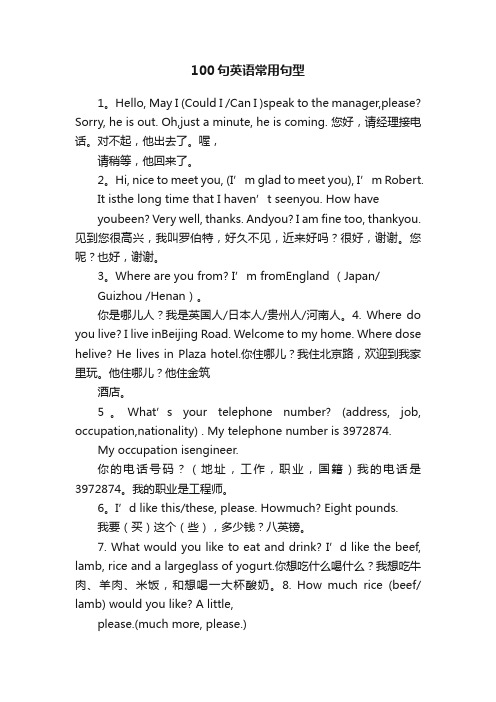
100句英语常用句型1。
Hello, May I (Could I /Can I )speak to the manager,please? Sorry, he is out. Oh,just a minute, he is coming. 您好,请经理接电话。
对不起,他出去了。
喔,请稍等,他回来了。
2。
Hi, nice to meet you, (I’m glad to meet you), I’m Robert.It isthe long time that I haven’t seenyou. How haveyoubeen? Very well, thanks. Andyou? I am fine too, thankyou. 见到您很高兴,我叫罗伯特,好久不见,近来好吗?很好,谢谢。
您呢?也好,谢谢。
3。
Where are you from? I’m fromEngland (Japan/Guizhou /Henan)。
你是哪儿人?我是英国人/日本人/贵州人/河南人。
4. Where do you live? I live inBeijing Road. Welcome to my home. Where dose helive? He lives in Plaza hotel.你住哪儿?我住北京路,欢迎到我家里玩。
他住哪儿?他住金筑酒店。
5。
What’s your telephone number? (address, job, occupation,nationality) . My telephone number is 3972874.My occupation isengineer.你的电话号码?(地址,工作,职业,国籍)我的电话是3972874。
我的职业是工程师。
6。
I’d like this/these, please. Howmuch? Eight pounds.我要(买)这个(些),多少钱?八英镑。
英文常用的62个英语句型+你必须掌握的英语口语

英文常用的62个英语句型句型1:There+be +主语+地点状语/ 时间状语There’s a boat in the river. 河里有条船.句型2:What’s wrong with+sb. / sth. ?What’s wrong with your watch?你的手表有什么毛病?句型3:How do you like...?How do you like China?你觉得中国怎么样?句型4:What do you like about...?What do you like about China?你喜欢中国的什么?句型5:had better(not)+动词原形You’d better ask that policeman over there. 你最好去问问那边的那个警察。
句型6:How+adj. / adv. +主语+谓语!What a/ an+adj. +n. +主语+谓语!How cold it is today !今天多冷啊!What a fine picture it is!多美的一幅图画呀!句型7:Thank+sb. +for(doing)sth.Thank you for coming to see me. 感谢你来看我。
句型8:So+be/ 情态动词/ 助动词+主语He is a student. So am I. 他是一个学生,我也是。
句型9:... not ... until ...He didn’t have supper until his parents came back. 直到他的父母回来他才吃饭。
句型10:比较级+and+比较级The baby cried harder and harder. 那孩子哭得越来越厉害。
句型11:the +比较级,the +比较级The more one has,the more one wants. 越有越贪。
句型12:... as +adj./ adv.+as ...…not as(so) +adj. / adv. +as ...Do you think that art is as important as music?你认为艺术和音乐一样重要吗?Last Sunday the weather was not so wet as it is today. 上个星期天的天气不如今天的天气潮湿。
英语常用的62个万能句型
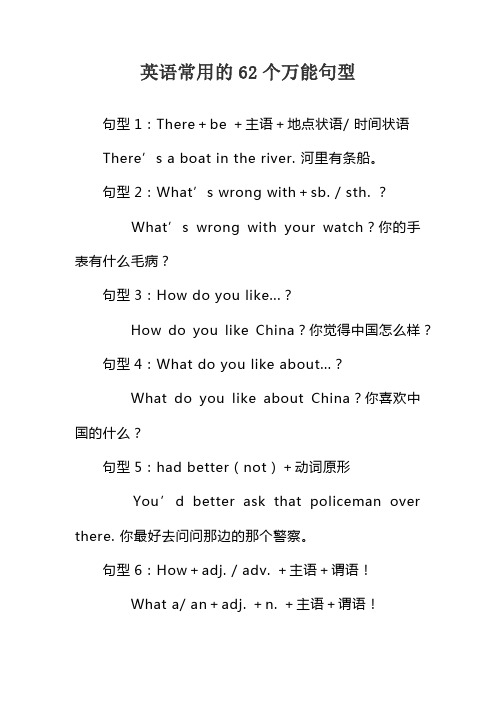
英语常用的62个万能句型句型1:There+be +主语+地点状语/ 时间状语There’s a boat in the river. 河里有条船。
句型2:What’s wrong with+sb. / sth. ?What’s wrong with your watch?你的手表有什么毛病?句型3:How do you like...?How do you like China?你觉得中国怎么样?句型4:What do you like about...?What do you like about China?你喜欢中国的什么?句型5:had better(not)+动词原形You’d better ask that policeman over there. 你最好去问问那边的那个警察。
句型6:How+adj. / adv. +主语+谓语!What a/ an+adj. +n. +主语+谓语!How cold it is today !今天多冷啊!What a fine picture it is!多美的一幅图画呀!句型7:Thank+sb. +for(doing)sth.Thank you for coming to see me. 感谢你来看我。
句型8:So+be/ 情态动词/ 助动词+主语He is a student. So am I. 他是一个学生,我也是。
句型9:... not ... until ...He didn’t have supper until his parents came back. 直到他的父母回来他才吃饭。
句型10:比较级+and+比较级The baby cried harder and harder. 那孩子哭得越来越厉害。
句型11:the +比较级,the +比较级The more one has,the more one wants. 越有越贪。
句型12:... as +adj./ adv.+as ...…not as(so) +adj. / adv. +as ...Do you think that art is as important as music?你认为艺术和音乐一样重要吗?Last Sunday the weather was not so wet as it is today. 上个星期天的天气不如今天的天气潮湿。
英语口语常用句型大全
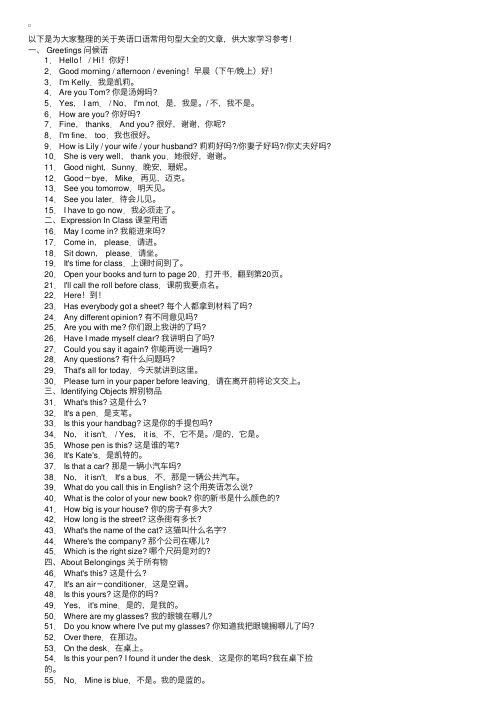
以下是为⼤家整理的关于英语⼝语常⽤句型⼤全的⽂章,供⼤家学习参考!⼀、 Greetings 问候语 1. Hello! / Hi!你好! 2. Good morning / afternoon / evening!早晨(下午/晚上)好! 3. I'm Kelly.我是凯莉。
4. Are you Tom? 你是汤姆吗? 5. Yes, I am. / No, I'm not.是,我是。
/ 不,我不是。
6. How are you? 你好吗? 7. Fine, thanks. And you? 很好,谢谢,你呢? 8. I'm fine, too.我也很好。
9. How is Lily / your wife / your husband? 莉莉好吗?/你妻⼦好吗?/你丈夫好吗? 10. She is very well, thank you.她很好,谢谢。
11. Good night,Sunny.晚安,珊妮。
12. Good-bye, Mike.再见,迈克。
13. See you tomorrow.明天见。
14. See you later.待会⼉见。
15. I have to go now.我必须⾛了。
⼆、Expression In Class 课堂⽤语 16. May I come in? 我能进来吗? 17. Come in, please.请进。
18. Sit down, please.请坐。
19. It's time for class.上课时间到了。
20. Open your books and turn to page 20.打开书,翻到第20页。
21. I'll call the roll before class.课前我要点名。
22. Here!到! 23. Has everybody got a sheet? 每个⼈都拿到材料了吗? 24. Any different opinion? 有不同意见吗? 25. Are you with me? 你们跟上我讲的了吗? 26. Have I made myself clear? 我讲明⽩了吗? 27. Could you say it again? 你能再说⼀遍吗? 28. Any questions? 有什么问题吗? 29. That's all for today.今天就讲到这⾥。
英语常用句型就这58句
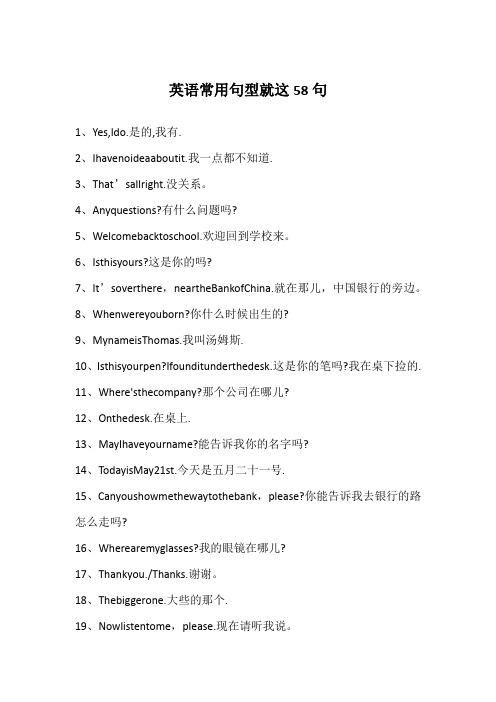
英语常用句型就这58句1、Yes,Ido.是的,我有.2、Ihavenoideaaboutit.我一点都不知道.3、That’sallright.没关系。
4、Anyquestions?有什么问题吗?5、Welcomebacktoschool.欢迎回到学校来。
6、Isthisyours?这是你的吗?7、It’soverthere,neartheBankofChina.就在那儿,中国银行的旁边。
8、Whenwereyouborn?你什么时候出生的?9、MynameisThomas.我叫汤姆斯.10、Isthisyourpen?Ifounditunderthedesk.这是你的笔吗?我在桌下捡的.11、Where'sthecompany?那个公司在哪儿?12、Onthedesk.在桌上.13、MayIhaveyourname?能告诉我你的名字吗?14、TodayisMay21st.今天是五月二十一号.15、Canyoushowmethewaytothebank,please?你能告诉我去银行的路怎么走吗?16、Wherearemyglasses?我的眼镜在哪儿?17、Thankyou./Thanks.谢谢。
18、Thebiggerone.大些的那个.19、Nowlistentome,please.现在请听我说。
20、What’syourname,please?你的名字是什么?21、It'stwoo'clock.现在两点.22、Hehasthatbook,doesn'the?他有那本书,是吗?23、Whattimeisitnow?现在几点?24、Happybirthday!生日快乐!25、Let’splayagametoday.今天我们来做个游戏。
26、Theoneonyourright.你右边的那个.27、Yes./Allright.Hereyouare.好的。
给你。
28、He'samanager.他是个经理.29、Yes,Iam./No,I'mnot.是,我是./不,我不是.30、Excuseme,what’sthetime,please?请问,几点了?31、Howabouttheblueone?这条蓝色的如何?32、Let’sgotoschool.让我们去学校吧。
英语学习常用的62个句型,地道口语
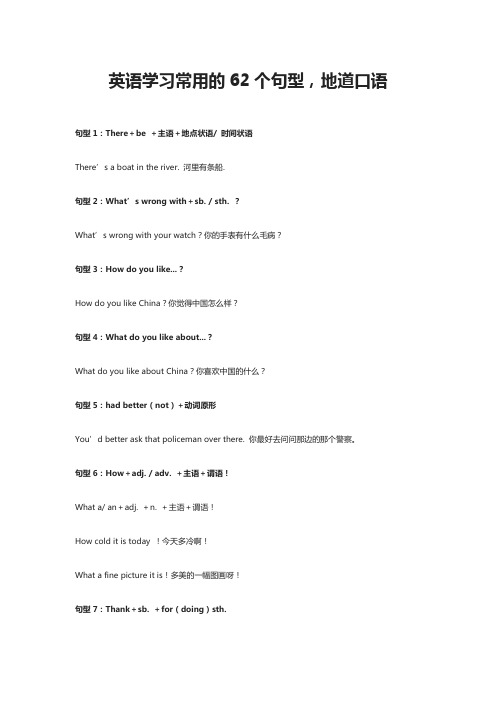
英语学习常用的62个句型,地道口语句型1:There+be +主语+地点状语/ 时间状语There’s a boat in the river. 河里有条船.句型2:What’s wrong with+sb. / sth. ?What’s wrong with your watch?你的手表有什么毛病?句型3:How do you like...?How do you like China?你觉得中国怎么样?句型4:What do you like about...?What do you like about China?你喜欢中国的什么?句型5:had better(not)+动词原形You’d better ask that policeman over there. 你最好去问问那边的那个警察。
句型6:How+adj. / adv. +主语+谓语!What a/ an+adj. +n. +主语+谓语!How cold it is today !今天多冷啊!What a fine picture it is!多美的一幅图画呀!句型7:Thank+sb. +for(doing)sth.Thank you for coming to see me. 感谢你来看我。
句型8:So+be/ 情态动词/ 助动词+主语He is a student. So am I. 他是一个学生,我也是。
句型9:... not ... until ...He didn’t have supper until his parents came back. 直到他的父母回来他才吃饭。
句型10:比较级+and+比较级The baby cried harder and harder. 那孩子哭得越来越厉害。
句型11:the +比较级,the +比较级The more one has,the more one wants. 越有越贪。
英语十四个句型
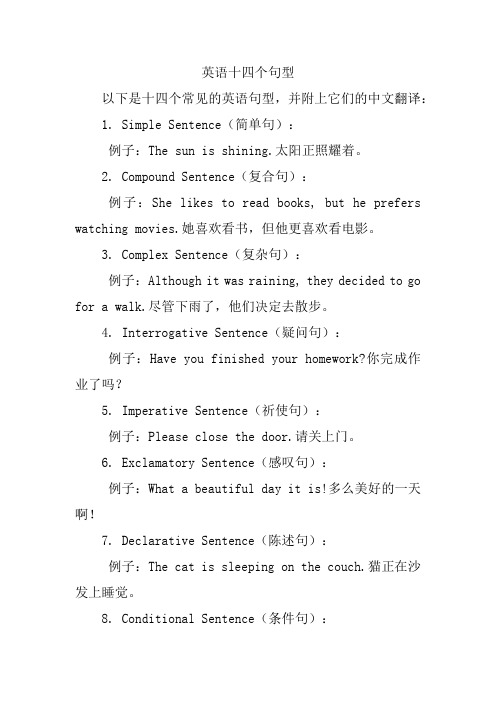
英语十四个句型以下是十四个常见的英语句型,并附上它们的中文翻译:1. Simple Sentence(简单句):例子:The sun is shining.太阳正照耀着。
2. Compound Sentence(复合句):例子:She likes to read books, but he prefers watching movies.她喜欢看书,但他更喜欢看电影。
3. Complex Sentence(复杂句):例子:Although it was raining, they decided to go for a walk.尽管下雨了,他们决定去散步。
4. Interrogative Sentence(疑问句):例子:Have you finished your homework?你完成作业了吗?5. Imperative Sentence(祈使句):例子:Please close the door.请关上门。
6. Exclamatory Sentence(感叹句):例子:What a beautiful day it is!多么美好的一天啊!7. Declarative Sentence(陈述句):例子:The cat is sleeping on the couch.猫正在沙发上睡觉。
8. Conditional Sentence(条件句):例子:If it rains, we will stay indoors.如果下雨,我们会呆在室内。
9. Passive Voice Sentence(被动语态句):例子:The cake was baked by Mary.蛋糕是玛丽烤的。
10. Direct Speech Sentence(直接引语句):例子:She said, "I will be there at 5 o'clock."她说:“我会在5点钟到那里。
- 1、下载文档前请自行甄别文档内容的完整性,平台不提供额外的编辑、内容补充、找答案等附加服务。
- 2、"仅部分预览"的文档,不可在线预览部分如存在完整性等问题,可反馈申请退款(可完整预览的文档不适用该条件!)。
- 3、如文档侵犯您的权益,请联系客服反馈,我们会尽快为您处理(人工客服工作时间:9:00-18:30)。
Ⅰ. ache 通常指一种持续的隐痛。 它可以与表身体某部分的词,组成复合词。如:
Where is the ache? 哪里痛?
I have a headache (stomachache, toothache atc).
Ⅱ. pain 是普通用语。不含持续痛的意味,尤指一种突然的剧痛。除指肉体上的外,还指精神的痛苦。如:
Your description is not very exact.你的描述不很确切。
Ⅲ.correct. “正确”指按照一定的标准或规则,而没有错误。在这有一个词中,它的语意最弱。
His answer is correct. 他的回答是正确的。
The thing turned out to be correct. 事情结果是对的。
Ⅱ. through “穿过、通过”指穿过两边。是从空间较狭窄的一头穿到另一头。是从内部穿过,含义与in有关。如:
We walked through the forest. 我们穿过森林。
The river flows through the city from west to east. 这条河从西到东流过城市。
Ⅰ. accident 可以表示事故,指不幸的意外事件。也表偶然的事件。
Twenty people were killed in the railway accident
He met with an accident. 这完全是偶然的事。
Ⅱ. Incident 的意思是事件,尤指与较重大的事件相比,显得不重要的事件。它还可以表引起国际争端或战争的事件。
I accepted it without question. 我毫无疑问地接受了它。
We have accepted his proposal. 我已接受了他的建议。
Ⅱ. receive “接到、收到、受到”表示其行为与主观意愿无关。如:
I received a letter from him. 我收到了他的来信。
The sun rose above the horizon. 太阳升到了地平线上。
The aero plane flew above the clouds.飞机在云层上飞行。
Ⅲ.over 表盖在……上面,或铺在……上面。此时不能用above.代替。含有垂直在上的意思。反义词为under.
Spread the tablecloth over the table.把桌布铺在桌子上。
§10 across/through/ over
Ⅰ. across “横过、穿过”,指从……的一边到另一边。含义与on有关。如:
I swam across the river. 我游过这条河(指从此岸到彼岸)
Let’s help push the cart across the bridge. 我们帮着把车子推过桥吧。
Ⅲ. over“横过、跨越”指横过道路、河流等“细长物”时,与across通用。Over 虽可指从表面的接触及跳(飞)越,但指渡过则不能用。从房间、原野、海洋等“平面延伸”的一端横越到另一端时也不能使用。而常用across.
She went across / over the bridge.
He jumped across / over the stream他跳过了小溪。
It is a quite common incident.这是很普通的事。
The Lugouqiao incident accrued on July 7th, 1937. 芦沟桥事件发生于1937年7月7日。
§6 accept/receive
Ⅰ. accept “接受”,表示其行为是由主观意愿决定的。
I have 100 yuan in hand. 我手头有100元钱。
The police immediately had the situation in hand. 警方立即控制了局势。
§8 accurate/exact/correct
Ⅰ. accurate “准确、精确” 不仅表无错误,且表细心,谨慎地做到符合标准,符合事实或真象。如:
She swam across the straight of Dover. 她游过了多佛尔海峡。
They drove across the desert. 他们驶过沙漠。
另外,over作介词还有“翻过……”的意思,如:climb the mountain 翻过那座山。
§11 affair/matter/business
He is not a bit (=not at all) hungry.他一点也不饿。
She ate not a little (=much). 她吃得很多。
Ⅴ. Not a bit 中分开。Eg:
He felt not a bit tired. = He didn’t feel a bit tired. 他觉得一点也不累。
§7 at hand/ in hand
Ⅰ. at hand“在手边;在附近;即将到来”如:
When he writes, he always keeps a dictionary at hand. 他写东西时,手边总有一本字典。
Spring is at hand. 春天就要来了。
Ⅱ. in hand “在手中的;现有的”引申为:“在掌握中;在处理中”。如:
Ⅳ. 否定形式 not a little 作状语,相当于very/ quite, “很”, “非常”;作定语和宾语时,相当于much, 意为 “许多”。而not a bit 作状语时,相当于not at all, 意为“一点也不”,作宾语时则相当于not much. Eg:
He is not a little (=very) hungry. 他饿极了。
I feel a great deal of pain. 我感到非常痛。
He cried with pain. 他痛得直叫。
I have a pain in the arm. 我手臂痛。
I have pains all over. 我浑身痛。
It gave us much pain to learn of the sad news. 听到不幸的消息很悲痛。
Ⅳ. on 含有与表面相接触的意思。
The book is on the desk.
There is an oil painting on the wall. 墙上有一幅油画。
Ⅴ.upon 也含有和表面相接触的意思。与on没有多大的区别,但较正式,口语中较少用。
He laid his hand upon the boy’s head. 他把手放在孩子的头上。
We should concern ourselves with state affairs. 我们要关心国家大事。
Ⅱ. matter“事、事情” 是普通用语,常指我们所写到或谈到的事情,要考虑和处理的事情。如:
This is a matter I know little about. 这件事我不大知道。
I’ll ask some one about the matter.关于这件事我将去问问人。
1 a bit/ a little
这两个词都意为“一点儿”有时可以互换,但有时不能。
Ⅰ.二者作程度副词修饰形容词、副词、动词或比较级时,意义相同,为“一点儿” “有些”。如:
I am a bit / a little hungry. 我有点饿。
He walked a bit / a little slowly. 他走路有点慢。
There is a little water in the bottle. = There is a bit of water in the bottle.
[注意] a little of 后的名词通常特指,表“……中的一些”,如:
①May I have a little of your tea?
① Few people will agree to the plan because it’s too dangerous.
②This text is easy to understand though there are a few new words in it.
There is little water left in glass. Will you please give me some
He received the present, but he did not accept. 他收到了礼物,但没有接受下来。
He received a good education.他受到了良好的教育。
[注] 在表示接待、接见时,通常用 receive, 而不用 accept.
如:We often receive foreign guests. 我们经常接待外宾。
[注] up 与以上几个不同,它表示向上方或高处,含有由下而上,由低而高的意思。常和表示运动的动词连用。作副词时,表示在上方或高处。
① We run up a hill. 我们跑上山。
② The plane was high up in the air.飞机在高空中。
§5 accident/incident “事故”
He felt not a little tired. 他觉得非常累。但不能说:He didn’t fell a little tired.
§2 a few/ few/ a little/ little
Ⅰ. a few和few修饰可数名词,a little和little修饰不可数名词;a few和a little表示肯定意义,few和little表示否定意义,可受only修饰。如:
